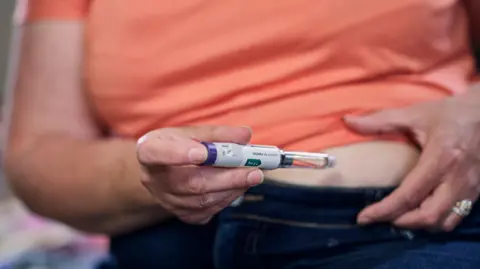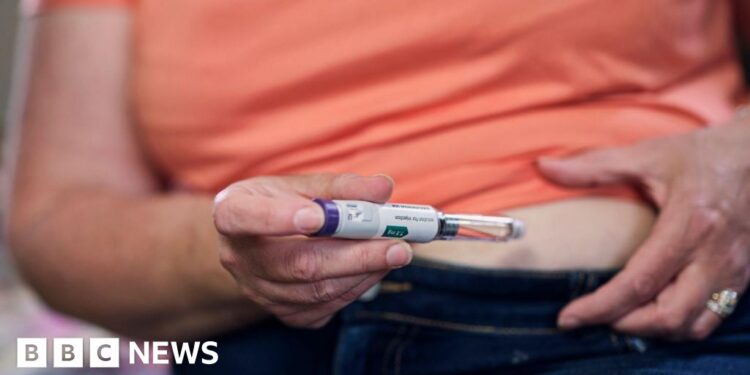Health reporter
 Getty Images
Getty ImagesTreatment for millions of people with type 2 diabetes should be more personalised, with greater access to newer medicines, including weight-loss drugs, the healthcare assessment body for England, Wales and Northern Ireland has recommended.
It calls the move “the biggest shake-up” in type 2 diabetes care in a decade.
Offering more people the new drugs will prevent complications such as heart disease, strokes and kidney damage, reduce costs to the NHS and potentially save lives, the National Institute for Health and Care Excellence (NICE) says.
Around 4.6 million people in the UK are diagnosed with diabetes – of these 90% have type 2, with another 1.3 million likely to be undiagnosed.
Having type 2 diabetes means there is too much glucose or sugar in the blood. This makes strokes, heart attacks, heart failure and other health conditions much more of a risk. It is now so common that 10% of the NHS budget goes towards treating it.
NICE, which produces guidance for the NHS on how to give patients the best care, recommends a move away from a “one size fits all” approach and towards more personalised treatment.
It is calling for newer diabetes medicines called SGLT-2 inhibitors, which protect the heart and kidneys as well as lowering blood sugar levels, to become the first-choice treatment for all diabetes patients. Around 2.3 million people will be eligible for these drugs.
Some 22,000 lives could be saved if 90% of all diabetes patients were prescribed them, NICE says, but access is not equal across the UK. There is evidence that women, older people and black people are less likely to be prescribed them.
“There is some urgency to find ways to increase the uptake of SGLT-2 inhibitors because if we were to achieve perfect uptake, the nation would be significantly healthier,” said Dr Waqaar Shah, chair of the guideline committee.
Only one in five people with type 2 diabetes and cardiovascular disease are currently prescribed the medicines.
Prescribing the tablets to more people would particularly benefit those living in poorer areas and ethnic minorities, NICE says.
Under the guidance, which is still at a draft stage and needs to go through a consultation, around 750,000 more people with type 2 diabetes will be offered GLP-1 agonists such as semaglutide and liraglutide, which have become very popular as the drugs contained in weight-loss jabs.
Adults with cardiovascular disease and some who develop type 2 before they are 40 are the groups recommended to be offered them.
These drugs can be used both to lower blood sugar levels and to support some people with weight loss.
Prof Jonathan Benger, deputy chief executive and chief medical officer at NICE, said the updated guidance was “a significant evolution” in type 2 diabetes treatment which could help prevent heart attacks, strokes and other serious complications before they happen.
“This guidance means more people will be offered medicines, where it is right to do so, to reduce their future risk of ill health,” he added.
The guidelines are part of a long-term plan by the NHS in England to reduce health inequalities and focus on preventing ill health in the first place.
The charity Diabetes UK said the announcement propelled type 2 diabetes treatments “into the 21st century”.
“These guidelines could go a long way to easing the burden of living with this relentless condition, as well as helping to address inequities in type 2 diabetes treatments and outcomes,” said Douglas Twenefour, head of clinical at the charity.
Source link : https://www.bbc.com/news/articles/cgkr2g3e5p1o?at_medium=RSS&at_campaign=rss
Author :
Publish date : 2025-08-20 00:51:00
Copyright for syndicated content belongs to the linked Source.




